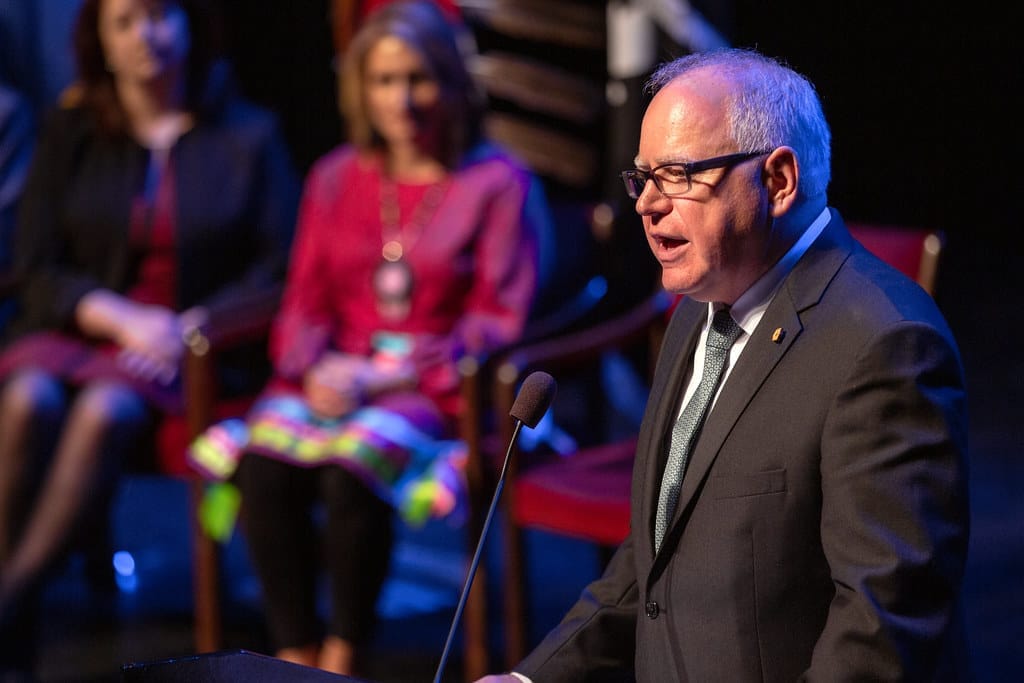
Community Broadband
Minnesota’s repeal of laws blocking municipal broadband ensures local governments can participate in the upcoming $42.45 billion BEAD grant program.

 Photo of Minnesota Gov. Tim Walz (D) used with permission.
Photo of Minnesota Gov. Tim Walz (D) used with permission.
WASHINGTON, May 24, 2024 – Minnesota state lawmakers repealed two state laws on Wednesday, effectively removing barriers preventing cities and towns from providing municipal broadband services.
The legislative change reduces the number of states with laws preempting local governments from building their own broadband networks to 16. Prior to the COVID-19 pandemic, 19 states held laws preventing community broadband networks.
The rollback of Minnesota’s preemption laws comes at a critical moment as states will soon begin to select grant recipients under a $42.45 billion Broadband Equity, Access, and Deployment program.
The statute establishing the BEAD program mandated that states receiving these funds cannot exclude local governments from applying to use them for building public broadband networks. However, with 16 states maintaining these restrictive laws, the future impact of the legal barriers remains uncertain.
With thesigning of SF 4097 by Gov. Tim Walz (D) on Wednesday, two long-standing Minnesota laws blocking municipal broadband were set aside.
The first repealed statute, Minn. Stat. Ann. § 237.19, required municipalities to secure a supermajority vote in a local referendum to buy or construct “telephone exchanges.” Although this statute was originally intended to regulate telephone service, it had been interpreted to impose the same supermajority requirement for building municipal broadband networks.
The second repealed statute, Minn. Stat. Ann. § 429.021(19), only allowed municipalities to improve, construct, extend, and maintain facilities for internet access if no private provider was offering service in that municipality.
The new law amends the “telephone exchange” language, granting any municipality the right to own and operate a telephone exchange within its borders. It now allows municipalities to construct new plants, purchase existing ones by agreement, or acquire them by condemnation if an agreement on price cannot be reached.
Additionally, the statute that previously restricted municipalities from offering broadband services in areas with private providers now permits them to maintain facilities for internet access.
However, municipalities must not discriminate in favor of their own communications facilities by offering more favorable or less burdensome terms compared to non-municipal service providers. This includes equal access to, and use of, public rights-of-way, municipally owned conduits, towers, and utility poles, as well as a fair permitting fee regime.
Christopher Mitchell, director of the Community Broadband Networks Initiative at the Institute for Local Self-Reliance,praised Gov. Walz and Rep. Zach Stephenson, DFL-Coon Rapids, for leading the effort to remove barriers to locally owned and operated broadband networks in the state, reports Community Networks.
Michell’s organization played a key role in securing language in the statute governing BEAD to ensure local and Tribal governments, as well as cooperatives, could apply for federal funding to build and expand broadband infrastructure.
“I have hoped for 17 years to see more deference to communities in how they want to solve these challenges that they understand better than anyone outside their region,” Mitchell said in response to the passage of SF 4097.
In a Wednesday statement, Gigi Sohn, executive director of the American Association for Public Broadband, said, “While sixteen states still restrict these networks in various ways, we’re confident this number will continue to decrease as more communities demand the freedom to choose the network that best serves their residents.”
